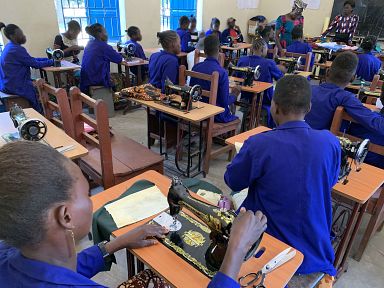As a fragile peace slowly settles in South Sudan, former child soldiers are gradually being demobilised. But do they still have a future?
As South Sudan has just formed a long delayed unity government, the country still has a long way to recover from more than five years of civil war. Some 4 million people are still refugees in neighbouring countries or internally displaced. The trauma is deep, especially among the most vulnerable.
Tens of thousands of children were subjected to grave violations - among them, former child soldiers, who suffered from, and often inflicted, extreme violence and abuse.
Near the town of Yambio, capital of the state of western Equatoria in the south of the country, recently demobilised youths are trying to rebuild their lives at the Tindoka vocational training centre.
Many, like 19-year-old Christian*, were forcibly enrolled. Captured by an armed group at the age of 13, he suffered a hellish existence for two years.
"We were sleeping just under the trees,” he told euronews reporter Valerie Gauriat. “To get food, it was difficult. Unless you went and attacked people.
“They would tell you to do bad things, like to go and slaughter someone. If you didn't do it, they would kill you. My brother - we were there with my brother - they killed him."
Anna* was barely 13 when she was captured on her way to school. Her ordeal lasted over a year.
“When we were there we were beating people, torturing people, robbing people's property. When we were told to shoot people, we had to do it. If you said no, they would torture you, or kill you. It was also hard for girls, because the boys used us as wives."
Anna is now learning to sew alongside the other young girls in the centre.
Like many of them, she is the mother of a young child. Anna, hopes to save money to pay for the future education of her little boy. And for her own: she dreams of becoming a doctor.
Christian and Anna are among some 3,600 children demobilised from armed forces or groups in South Sudan with the help of the United Nations.
The training is part of a three-year rehabilitation program for former child soldiers, co-funded by the European Union.
Mathias Eick, of EU Humanitarian Aid, said addressing the needs of the children is one of the prime focuses.
He told Aid Zone: “There are over two million children who have lost out on any form of education. What we are trying to focus on is the children because we don't want another lost generation, to give them some sort of basic education, to give them basic skills, so they can participate in the reconstruction of their country."
Christian, like all participants in the program, has benefited from psychological and social support which is crucial to help former child soldiers overcome their traumas.
So are the social workers following them throughout the three years of the programme. They are key to helping them reintegrate their communities. A major challenge.
Christian was rejected by his father and was taken in by the brother of his dead mother.
"When he came back he was wild,” his uncle told Aid Zone. “He couldn't understand anything. Even me, his own uncle, I was afraid of him. Since he went to school, he learned many things and changed a lot. Now when he comes, he can greet people, he can smile. It's a big change."
Managed by UNICEF, the program has transformed the lives of many.
But its future could be compromised for lack of funds.
UNICEF’s Helene Sandbu Ryeng said: “This program has been underfunded for over a year, and we've been using other resources to keep it going. But now these funds are exhausted. So unless we have fresh funding coming in, we might need to close Tindoka.”
Thousands of children are still in the hands of the armed forces and groups.
“With the potential peace being prolonged, we will see more children coming out of the woods, and they will need our help" she says. "But without funds, we can't help them properly. "
Christian wants to become a plumber. But he knows that his future, and that of thousands of other war children, depends on the sustainability of the peace process in South Sudan.
“Not many people build concrete houses here, because our place is still full of war” he says. Before concluding, quietly: “But if there is peace, everything is possible”.












